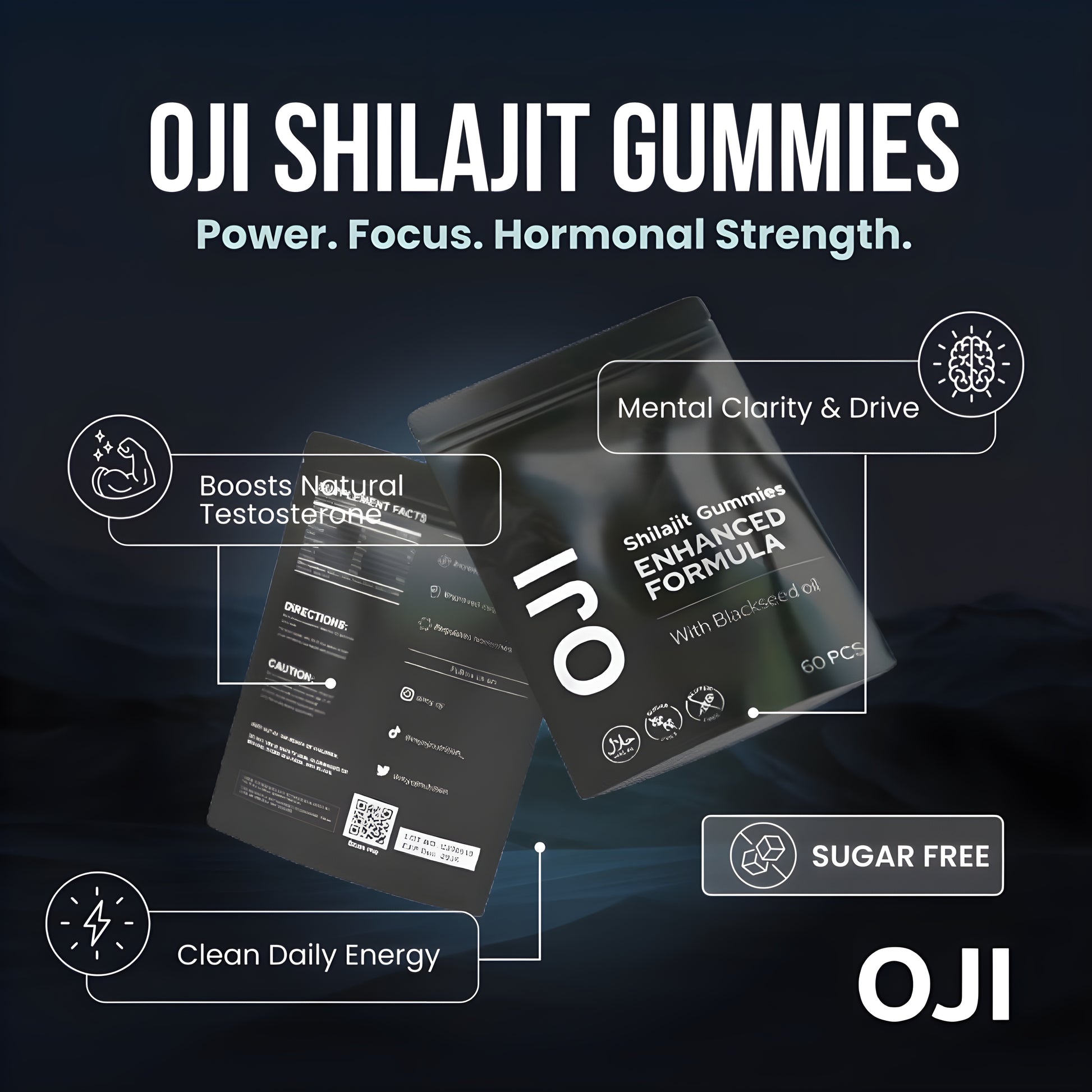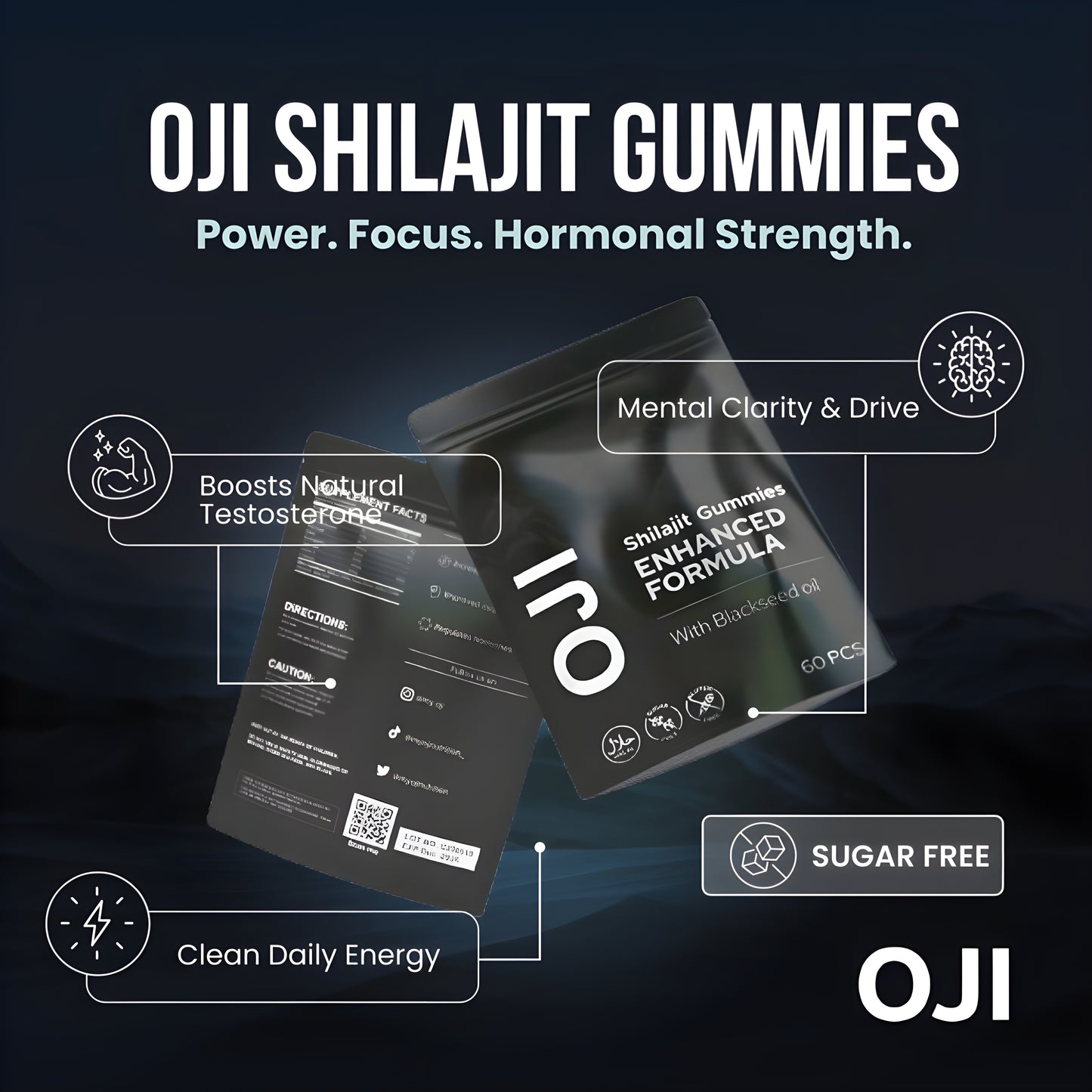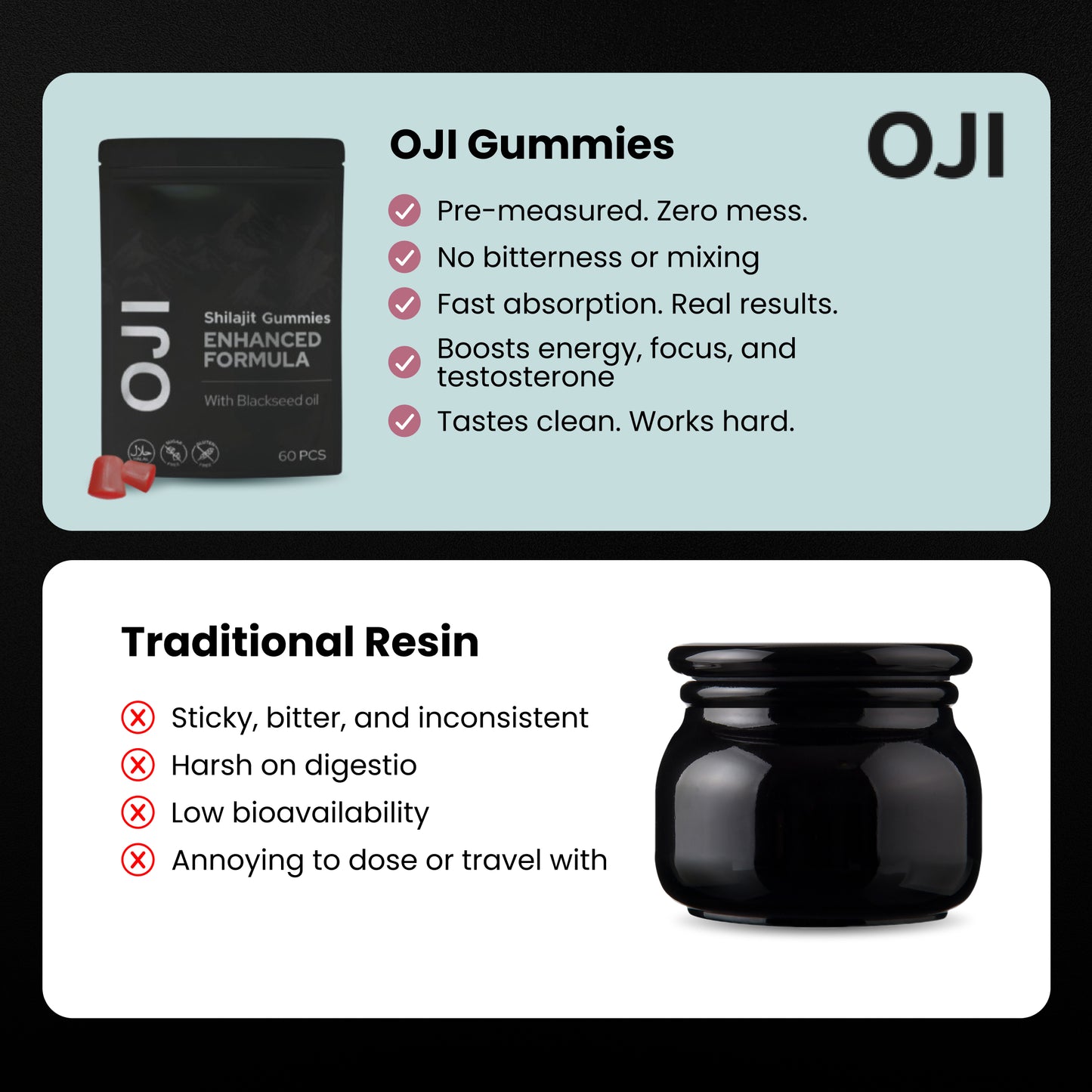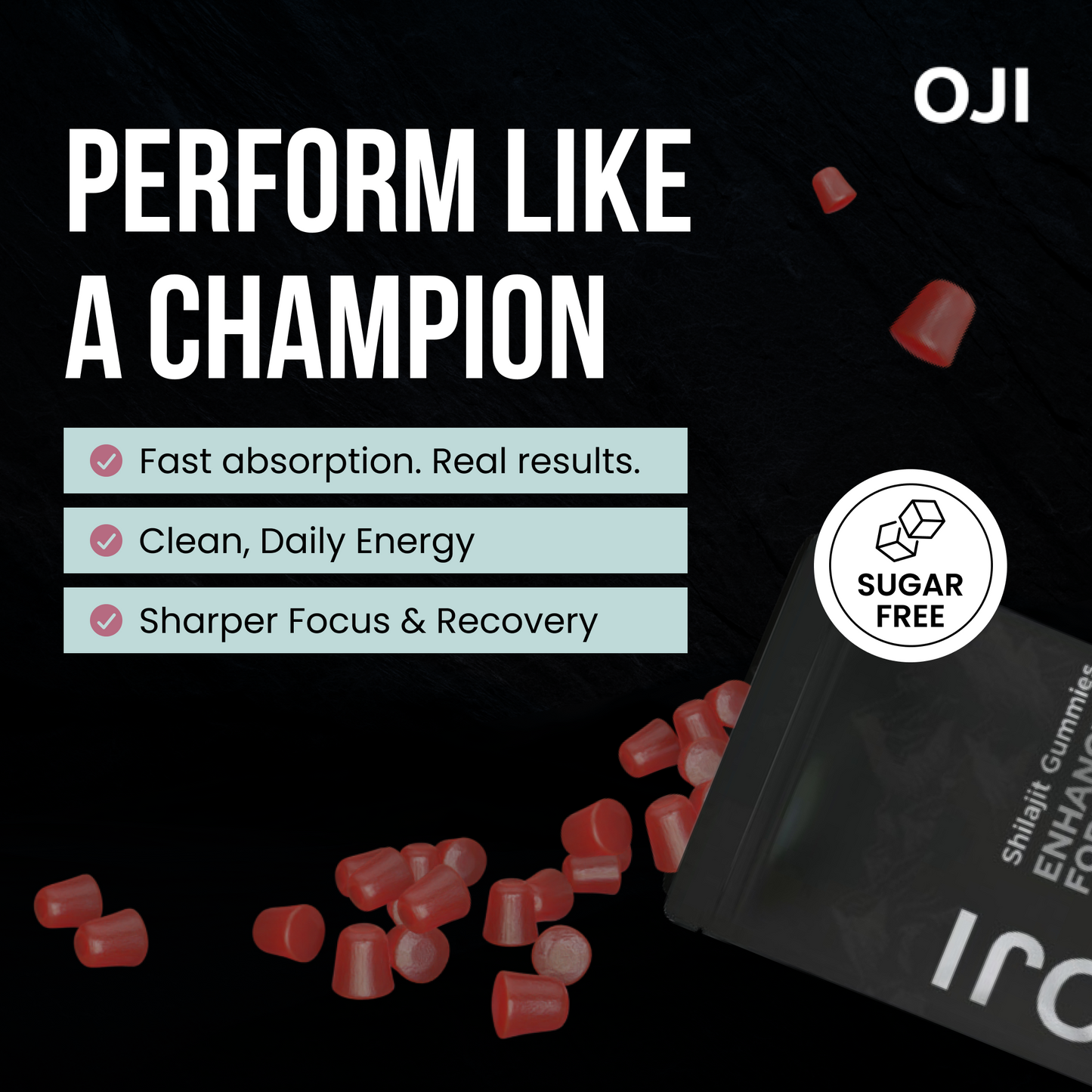Feeling completely shattered, overwhelmed, and just not your usual self? If that sounds familiar, you’re definitely not alone. A lot of people across the UK are grappling with a set of symptoms often grouped together under the name ‘adrenal fatigue’.
Natural treatment for adrenal fatigue is all about rebuilding your body’s resilience. This means making smart changes to your diet, getting serious about managing stress, and prioritising restorative sleep. While ‘adrenal fatigue’ isn’t a formal medical diagnosis, the crippling exhaustion and brain fog you’re feeling are very real. A holistic approach can genuinely help you get your energy and sense of balance back.
What Is Adrenal Fatigue and Why Is It So Common in the UK?
Think of your adrenal glands as your body’s built-in emergency response team. When you hit a stressful situation—a looming deadline, a row with a loved one, or even just a nightmare commute—they pump out hormones like cortisol to help you push through. In short, sharp bursts, this system is brilliant. The problem is, modern life often means the alarm bells are constantly ringing.
The Modern Stress Epidemic
Relentless pressure from work, money worries, and the fact we're always ‘on’ thanks to our phones can leave this stress response system permanently activated. This non-stop demand is what can lead to an imbalance, fuelling the very real symptoms you’re experiencing day in and day out.
Your body simply wasn't built for the marathon of chronic stress that has become the norm in our society. That constant feeling of being 'wired but tired' is a massive red flag that your internal systems are struggling to cope.
This isn't just a vague feeling; it's a huge issue. The symptoms often look a lot like recognised conditions such as chronic fatigue syndrome (CFS) or myalgic encephalomyelitis (ME). In fact, fatigue-related disorders are a major health concern in the UK. After crunching the numbers, hospital data from England suggests an estimated 392,000 people may have post-viral fatigue syndrome, a condition with symptoms that frequently overlap with those blamed on adrenal fatigue. If you want to dig deeper into the stats on fatigue syndromes in the UK, the research from ME Research UK is a real eye-opener.
Understanding the Signs
When your body's stress response goes haywire, it can manifest in a few key ways. Spotting these signs is the first step towards getting back on your feet. The most common indicators include:
- Persistent exhaustion, even when you’ve had what should be a full night’s sleep.
- Struggling to handle stress, feeling easily overwhelmed or anxious about small things.
- Intense cravings for salty or sugary foods as your body desperately searches for a quick energy hit.
- Brain fog, making it hard to concentrate or remember simple things.
- A strange "second wind" of energy late at night, which messes up your sleep schedule.
The good news? You can absolutely support your body’s recovery. An effective natural treatment plan for adrenal fatigue isn't about a magic pill, but about making lasting changes that properly nourish your body and calm your nervous system. By focusing on your diet, lifestyle, and specific stress-reduction techniques, you can start to rebuild your energy and feel like yourself again.
Building Your Adrenal Recovery Diet
Your journey back to feeling like yourself really begins on your plate. I want you to stop thinking of your diet as a list of "can'ts" and start seeing it as your most powerful tool for rebuilding your energy and giving your body the raw materials it needs to heal. A solid, natural approach to adrenal fatigue is built on a foundation of good nutrition, with a sharp focus on keeping your blood sugar stable.
When you're utterly drained, it’s second nature to reach for sugar and caffeine for a quick pick-me-up. We've all been there. But this just locks you into a nasty cycle of energy spikes and brutal crashes, putting even more demand on your already taxed adrenal glands. The real goal is to provide a slow, steady stream of energy all day long.
One of the simplest and most effective things I tell my clients is to eat a balanced, protein-rich breakfast within one hour of waking. It’s a game-changer. This small act helps level out your morning cortisol and sets a stable energy baseline for the day ahead, helping you dodge that dreaded mid-morning slump.
Fuelling Your Body with Adrenal-Friendly Foods
To really support your adrenal glands, you need to zero in on the specific nutrients that chronic stress burns through. Think of these as the essential building blocks for your recovery.
A few key players to focus on are:
- Vitamin C: Absolutely crucial for adrenal function. It helps your body regulate cortisol production. You’ll find plenty in bell peppers, broccoli, citrus fruits, and berries.
- B Vitamins: Especially B5 and B6. They’re vital for producing hormones and metabolising energy. Load up on chicken, eggs, avocados, and sunflower seeds.
- Magnesium: Often called the ‘calming mineral’ for good reason. Magnesium helps manage your body’s stress response. It’s abundant in dark leafy greens like spinach and kale, as well as nuts and seeds.
Never underestimate the power of whole foods. Every colourful vegetable, piece of lean protein, and portion of healthy fat you eat is a direct deposit into your recovery account, replenishing what your body lost during periods of high stress.
Making these changes isn't random; it's a logical progression. This visual guide maps out the core steps of your recovery, starting with understanding your body's needs and moving towards daily supportive habits.
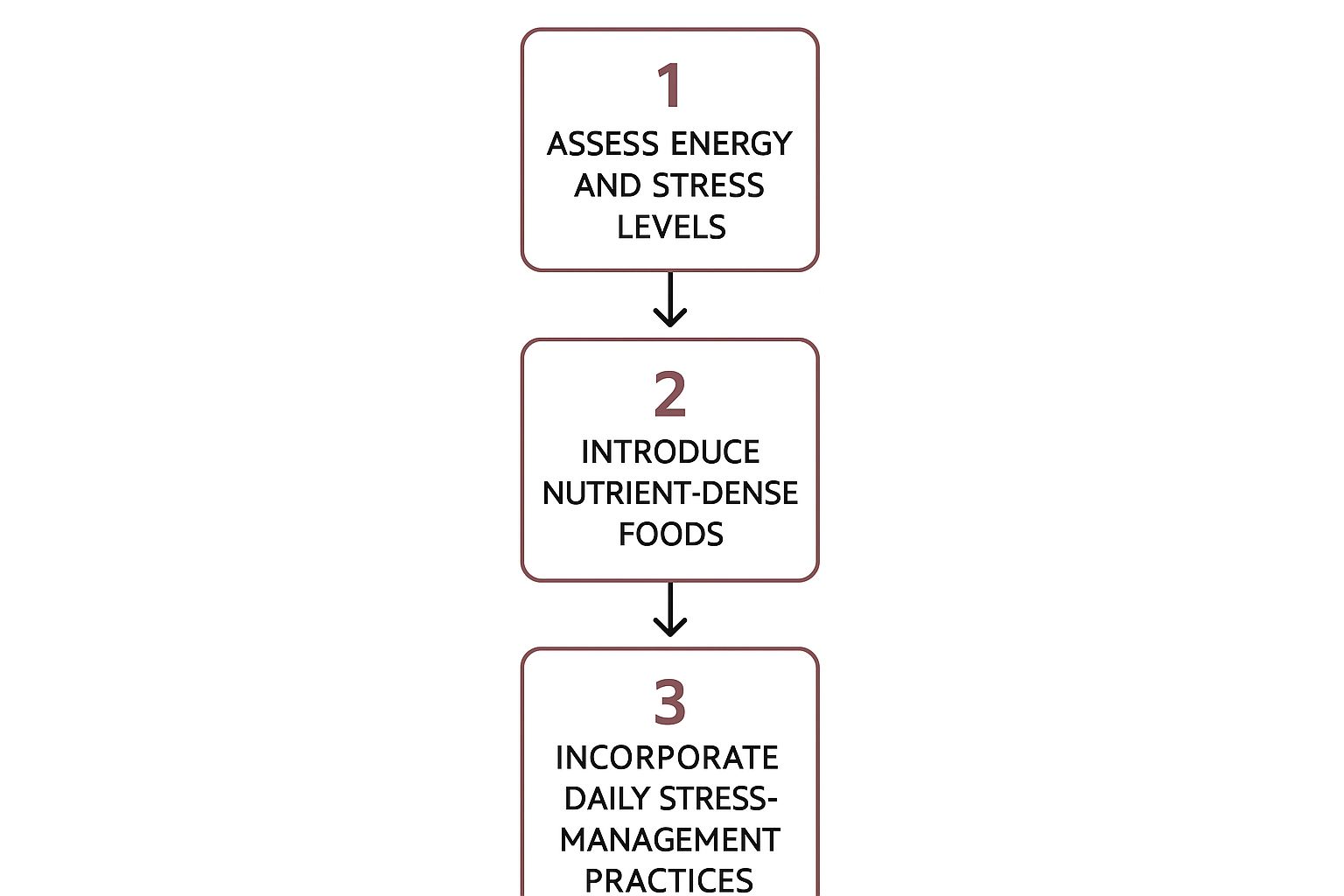
As you can see, recovery is all about layering these supportive practices. You start with your diet and then weave in things like stress management for a truly holistic approach.
To make things easier, here’s a quick-reference table to guide your food choices.
Adrenal Supporting Foods vs Foods to Minimise
| Nutrient-Dense Foods to Include | Foods to Reduce or Avoid |
|---|---|
| Lean proteins like chicken, fish, and eggs | Refined sugar and sugary drinks |
| Leafy greens such as spinach and kale | Processed carbohydrates like white bread and pastries |
| Nuts and seeds, especially almonds and pumpkin seeds | Excessive caffeine from coffee and energy drinks |
| Colourful vegetables like bell peppers and broccoli | Fried and processed foods |
| Healthy fats from avocados and olive oil | Alcohol, which can disrupt sleep and stress hormones |
| Low-sugar fruits like berries | Artificial sweeteners |
Focusing on the foods in the left-hand column will provide the stable energy and nutrients your body is crying out for.
What to Reduce for Better Adrenal Health
Just as important as what you add to your plate is what you decide to leave off it. Some foods and drinks actively work against you by messing with your blood sugar and hormones, which can make your symptoms feel so much worse. The main culprits to watch out for are refined sugars, processed carbs (think white bread and pastries), and too much caffeine.
These troublemakers cause rapid blood sugar spikes, forcing your adrenals to go into overdrive.
While a solid diet is your foundation, sometimes your body needs a bit more targeted support. If you're curious about what else might help, you might find our guide on the 8 best supplements for fatigue you should know useful. Just remember to always have a chat with a healthcare professional before starting any new supplement to make sure it’s the right move for you.
By combining a nourishing diet with smart lifestyle choices, you're paving the way for genuine, lasting healing.
Practical Stress Management for Real Life

We've all heard the advice to ‘reduce stress’, but it’s one of those things that’s far easier said than done. The reality is, stress is the main culprit behind adrenal burnout. So, if you're serious about long-term, natural recovery, getting a handle on it isn't optional—it's essential.
This isn’t about trying to live a completely stress-free life, because let's be honest, that's impossible. It's about building up your resilience so you can handle what life throws at you without crashing.
The first step is simply figuring out where your stress is actually coming from. I often ask my clients to keep a 'stress inventory' for a week. Just make a quick note every time you feel tense, overwhelmed, or anxious. What was happening? A demanding email, a family squabble, worrying about a bill? This simple act takes you from a vague feeling of being 'stressed' to having a clear list of your biggest triggers.
Simple Mindfulness You Can Do Anywhere
Once you know what sets you off, you can start using simple techniques to break the cycle. You don't need to book an hour-long yoga class; all it takes is a few minutes to reset your nervous system.
One of the most powerful tools I recommend is the 4-7-8 breathing technique. It's incredibly effective at calming that 'fight-or-flight' feeling. Here's how it works:
- Breathe in quietly through your nose for 4 seconds.
- Hold your breath for a count of 7 seconds.
- Breathe out completely through your mouth, making a 'whoosh' sound, for 8 seconds.
Just doing this three or four times can make a world of difference. You can do it at your desk, in the car, or even in a bathroom cubicle when the pressure is on. Workplace stress is a huge factor for many people, and it’s vital to have strategies ready. If that's a big one for you, have a look at our guide on how to reduce stress at work for more targeted tips.
Gentle Movement and Active Rest
When your adrenals are already overworked, intense exercise can actually add more stress to the system. The key is to switch your focus to gentle, restorative movement instead.
Think about a daily 20-minute walk, especially somewhere green if you can. It's been shown to significantly lower cortisol levels. Gentle yoga or simple stretching is also brilliant for releasing all that physical tension we tend to hold in our bodies.
I also talk a lot about 'active rest'. This isn't just collapsing in front of the TV. It means making time for things that genuinely recharge you—like getting lost in a good book, listening to music, or just spending some quiet time in the garden. Making these activities a priority is a powerful way to give your adrenals the break they desperately need.
How Restorative Sleep Heals Your Adrenals

If diet is the foundation of your recovery, think of sleep as the essential nightly repair crew. When you're dealing with adrenal burnout, quality sleep isn't a luxury—it’s a non-negotiable part of any natural treatment for adrenal fatigue. It’s during these crucial hours that your body gets down to its most important healing work, rebalancing hormones and repairing cellular damage.
Your body’s main stress hormone, cortisol, is supposed to follow a natural rhythm. Ideally, it's highest in the morning to wake you up and get you going. It should then gradually taper off throughout the day, hitting its lowest point at night so you can drift into a deep, restorative sleep.
Chronic stress flips this cycle on its head. You end up with low cortisol in the morning (that feeling of being glued to your bed) and a frustrating spike at night, making it impossible to switch off. This hormonal chaos is precisely why so many people with adrenal issues complain of feeling 'wired but tired' at bedtime. Your mind is racing a mile a minute, but your body is completely exhausted. Prioritising sleep helps to reset this natural rhythm, which is absolutely fundamental to your healing.
Your Guide to Better Sleep Hygiene
Upgrading your sleep hygiene is all about sending clear, consistent signals to your body that it's time to wind down. This means creating a routine that genuinely promotes relaxation and prepares you for a night of uninterrupted rest. It’s not about perfection, but consistency is key.
A few powerful changes can make a world of difference:
- Declare a Digital Sunset: This is a big one. Switch off all screens—phones, tablets, TVs—at least 90 minutes before bed. The blue light they throw off messes with your production of melatonin, the very hormone that tells your body it’s time to sleep.
- Create a Wind-Down Ritual: Dedicate 20-30 minutes to something calming. Try reading a physical book (not on a screen!), taking a warm bath with Epsom salts (they're rich in relaxing magnesium), or listening to some soothing music.
- Optimise Your Bedroom: Your bedroom should be a sanctuary for sleep and nothing else. Make it as dark as possible with blackout curtains, keep the temperature cool (around 18°C is perfect), and clear out any distracting clutter.
It's amazing how much small light sources can affect us. Even the tiny standby light on your TV or a sliver of light from a streetlamp can be enough to disrupt melatonin and stop you from getting into those deep, healing stages of sleep.
Tackling the 2 AM Wake-Up Call
Waking up between 2 AM and 4 AM with your mind suddenly wide awake is one of the most common and frustrating signs of adrenal imbalance. This isn't random—it's often a tell-tale sign of a blood sugar crash. Your body senses this drop, panics, and releases stress hormones like cortisol and adrenaline to bring your blood sugar back up. The result? You’re jolted awake.
To fight this, try having a small, strategic snack about 30 minutes before bed. You're looking for something that combines a little protein and healthy fat to provide a slow-release source of energy, keeping your blood sugar stable all night long.
A small handful of almonds, a spoonful of nut butter, or a few slices of avocado are all fantastic options. From my experience, this simple little trick can be an absolute game-changer for staying asleep through the night.
Using Supplements and Herbs for Adrenal Support
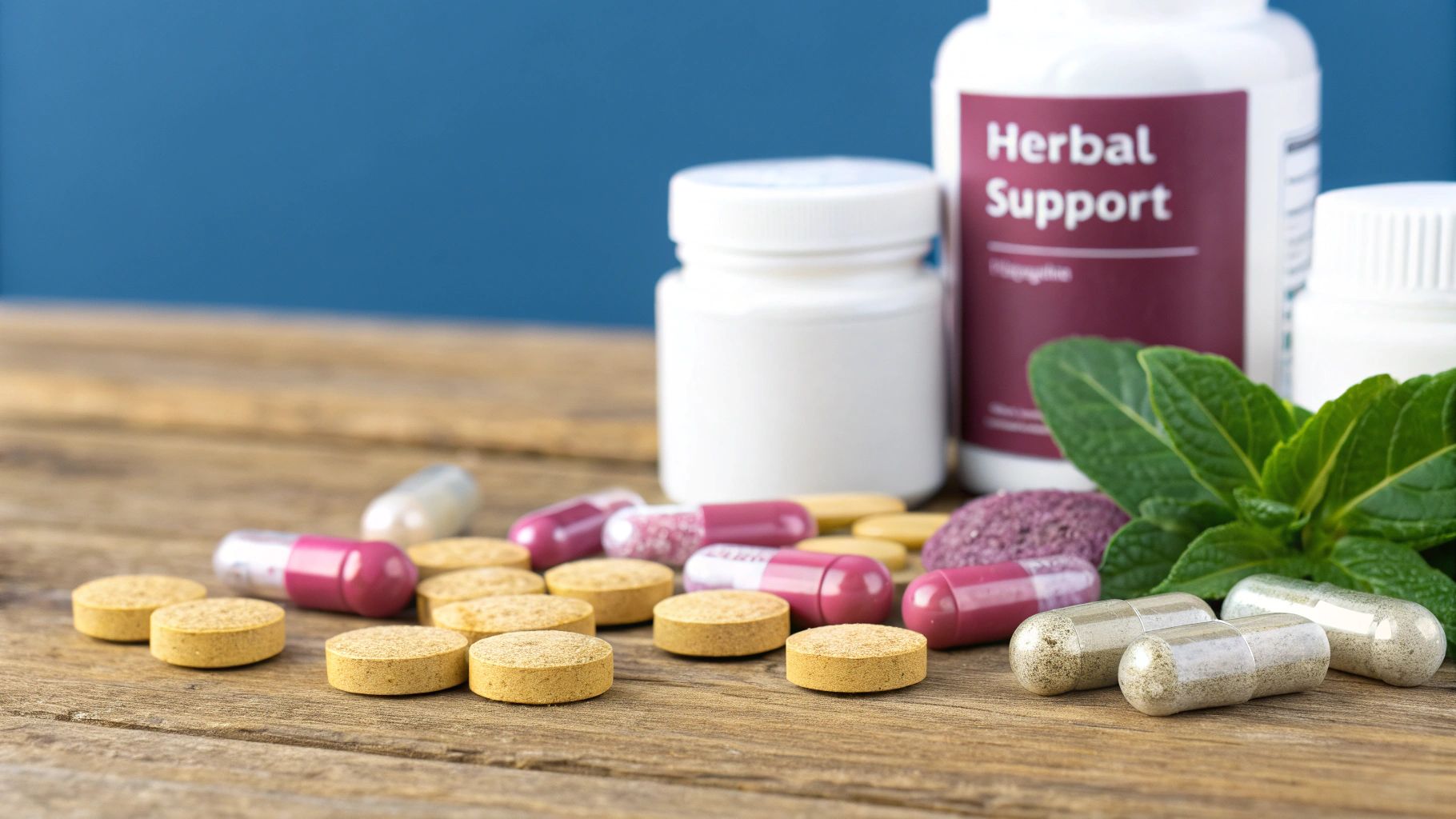
While changing your diet and lifestyle are the absolute cornerstones of recovering from adrenal exhaustion, sometimes your body just needs a bit more targeted support. I get it, looking at the world of supplements can feel pretty overwhelming. My goal here is to give you a clear, sensible starting point.
But first, a crucial reminder: this is all for educational purposes. Please, always chat with a qualified healthcare professional before adding any new supplements to your routine. They can help figure out what’s right for your specific symptoms and make sure nothing will interfere with medications you might already be taking.
Let’s start with the basics. When you’re under chronic stress, your body burns through certain nutrients at an alarming rate. Your adrenal glands are huge consumers of these, so simply topping up your stores is one of the most logical first steps.
- Vitamin C: This is for so much more than just fending off colds. Your adrenal glands actually hold one of the highest concentrations of Vitamin C in your entire body, and it's absolutely vital for producing cortisol.
- B-Complex Vitamins: Think of these as the spark plugs for your internal engine. Vitamins like B5 (Pantothenic Acid) and B6 are especially important for creating adrenal hormones and keeping your energy cycle running.
- Magnesium: Often called the 'calming mineral', and for good reason. Magnesium helps to settle your nervous system and can be incredibly helpful for improving sleep and managing that on-edge feeling.
Harnessing the Power of Adaptogens
Beyond the essential vitamins, there's a special class of herbs known as adaptogens that can be game-changers. These are remarkable plants that help your body become more resilient to physical, chemical, and biological stress. They don't just put a plaster on your symptoms; they work to rebalance your body's functions and strengthen the very systems that have been worn down by stress.
Adaptogens are clever. Instead of forcing your body in one direction, they help it find its own equilibrium. If you're feeling 'wired' and anxious, they can help bring you down. If you're exhausted, they can support your energy in a steady, sustainable way.
Here are a few of the most trusted and well-researched adaptogens for adrenal support:
- Ashwagandha: Many people call this the 'calming adaptogen'. It's brilliant for anyone who feels anxious, overwhelmed, and stuck in that 'wired but tired' state. It's known to help lower cortisol, which encourages a sense of calm and better sleep.
- Rhodiola Rosea: This one is more of an 'energising' adaptogen. It’s excellent for fighting that heavy fatigue and brain fog, helping to sharpen your mind and boost physical endurance without the jitters you'd get from a strong coffee.
- Holy Basil (Tulsi): Held in high regard in Ayurvedic tradition, Holy Basil is fantastic for its calming effects and its ability to help balance out blood sugar and cortisol levels.
It’s important to see how this fits into the bigger picture. In the UK, primary adrenal insufficiency affects about 120 cases per million people, while the more common secondary form impacts 150 to 280 people per million. These figures from NICE show that while medically diagnosed adrenal insufficiency is relatively uncommon, issues that affect how our adrenals function are a significant concern. You can read the full resource impact summary report from NICE to learn more.
When you're choosing a supplement, always look for a reputable brand that uses high-quality ingredients and gives you clear dosage information. Bringing supportive herbs into your routine can be a powerful part of your recovery. If you're curious about other unique, mineral-rich substances, you might also want to explore our article on the benefits of Shilajit for boosting energy and wellness.
Of course. Here is the rewritten section, crafted to sound completely human-written and natural, following the expert tone, style, and formatting of the provided examples.
Your Adrenal Fatigue Treatment Questions, Answered
Deciding to tackle adrenal fatigue naturally is a big step, and it's totally normal to have a ton of questions swirling around. What can I expect? How long will this take? Am I doing this right? It's a journey, and you're bound to hit a few bumps. Let's clear up some of the most common queries I hear, so you can move forward with confidence.
Remember, this is about patience and being kind to yourself. These symptoms didn't pop up overnight, and rebuilding your body’s resilience is a process that takes time.
How Long Does It Take to Recover?
This is the big one, isn't it? The honest answer is that it's different for everyone. How long you’ve been feeling burnt out, your current stress levels, and how consistently you can stick to the new diet and lifestyle habits all play a massive role.
Most people start to feel small shifts—a little more energy, a brighter mood—within a few weeks of making real, consistent changes. But for that deep healing, where you feel genuinely strong and resilient again, you need to think in months, not weeks. For some, a full recovery could take a year or more.
Think of it like repaying an energy debt. If you've been running on an 'overdraft' for years, it will take a while to get back into credit. The key is to celebrate the small wins and focus on steady progress rather than a quick fix.
What If I Feel Worse Before I Feel Better?
It sounds backwards, I know, but feeling a bit rough at the start can actually be a good sign. This often happens when you make big dietary shifts, like cutting out sugar and caffeine. Your body has been using them as a crutch, and taking them away can trigger withdrawal symptoms like headaches, irritability, or even more fatigue for a little while.
Also, as your body finally switches from high-alert into rest-and-repair mode, you might suddenly realise just how bone-deep tired you really are. This isn't a setback. It's your body finally getting the quiet it needs to tell you what's really going on. Stick with it, get as much rest as you can, and this phase should pass within a week or two.
Can I Still Exercise?
Yes, absolutely—but you'll probably need to rethink what "exercise" looks like. One of the most common mistakes I see is people trying to push through gruelling, high-intensity workouts. When your adrenals are already struggling, this just adds another layer of stress to your system and can set your recovery back.
Your focus now should be on restorative movement. Gentle, calming activities are your best friends.
- Daily Walks: Just 20-30 minutes is perfect, especially if you can get out in nature.
- Gentle Yoga or Stretching: Fantastic for releasing tension and calming your nervous system.
- Tai Chi: This slow, mindful practice is incredible for lowering stress.
The golden rule is to listen to your body. If a workout leaves you feeling more tired than when you started, it was too much. You want to finish feeling gently energised, not completely drained. As you get stronger, you can slowly and carefully start to bring back more intense exercise.
Ready to give your body foundational support with a potent blend of minerals and adaptogens? Oji Shilajit gummies combine over 85 essential minerals with Ashwagandha and Lion’s Mane to help you restore energy, sharpen focus, and build resilience against stress—all in a simple, great-tasting format. Reclaim your vitality by visiting https://myoji.co.uk today.


